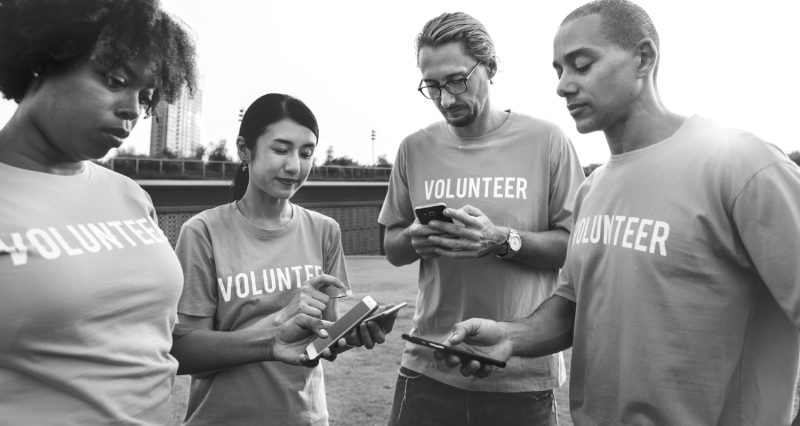What does it mean to be human? Is it the economic development humans have brought about? Or maybe the societies that have formed over the years? Could it be the relationships people have with their surroundings and one another?
There are so many colors to being a human, but one defining hue of all is altruism. Simply explained as “a genuine concern for other people’s well-being,” it is the actions people take without expecting anything in return. By bringing in a sense of belonging, connection, and kindness, altruism creates beautiful images on the canvas of the world.
One of the ways to create this image is through volunteering, which is the action of doing something good using your time, skills, and resources for other people or organizations without expecting anything in return. Volunteering and charity are closely related concepts, making the former the most common form of altruism.
Many wonder how to volunteer, but few think about the potential results. Volunteering improves not only the positive development of a community, levels of social action, and physical and mental health of the volunteers but also develops the archetype of altruism. This article will talk about how these results are made possible.
Examining the benefits of volunteering
Everyone experiences different transformative and meaningful benefits of volunteering. But some things seem to stay the same.
Improved well-being and life satisfaction
Research on the impact of volunteering found that volunteers often experience improved subjective well-being and additional benefits like a sense of connection and reciprocity towards their community, further elevating their well-being.
The act of volunteering involves skill-building in a variety of areas. You enhance your social skills, which provides a healthy boost to your confidence and esteem. When people act out of pure goodness, there is a sense of wholeness and warmth — a universal feeling of accomplishment that directly leads to life satisfaction.
Read more: What ‘Life Satisfaction’ Truly Means
Better mood
According to one study, volunteering most frequently led to positive psychological impacts. The act of volunteering has been shown to positively impact numerous negative emotions, making it a notable beneficial influence on depressive mood, anxiety, and life satisfaction. You will read about this in more detail later.
Stronger sense of community
The act of volunteering is for the world, as it always has been. Though it may seem obvious, the relationship between volunteering and building stronger communities has been quite elusive. However, there is evidence that volunteering does lead to many community changes.
In a literature study, researchers found that volunteering is affected a lot by situations and people. Interestingly, this study looked at community cohesion and resilience, particularly some factors that lead to community strength. The researchers studied the community based on relationships and abilities to deal with different situations. Volunteering led to improved community cohesion and resilience solely due to the social interactions involved.
This is just one of the few examples of how volunteering can lead to a stronger community. Learning from these examples and actively applying them to your life can make such positive results possible for you and your community, too.
Amplified empathy
Being a selfless helper can be mentally exhausting, and often, one needs to feel deeply for a cause to contribute towards it. Not only is empathy one of the defining qualities of a volunteer, but it is also one of the primary reasons for any prosocial behavior. Because empathetic emotions lead a person to imagine and feel the emotions of others vividly, it is often followed by some helping behavior.
Empathy itself has been frequently associated with life satisfaction and well-being. With the addition of volunteering as a behavior, the psychological resources within the community increase, resulting in improved community mental health.
Why do people volunteer?
If you try to think about all the reasons people should not volunteer, you could probably immediately come up with at least five in less than a minute. Yet one out of four American adults spend some of their time volunteering, even more so during the festive season. So, what makes people contribute their time and energy for nothing in return?
Snyder and Omoto, American social psychologists specializing in personality and behavior, identified a few ‘whats’ of these volunteers — these range from objective values and morals to subjective personal development and career-boosting reasons.
Dr. Daniel Batson, an American social psychologist with doctorate degrees in theology and psychology, and his colleagues believed that volunteering leads to the formation of a motivational state where people wish to increase the welfare of others.
He uses a variation of the classical Milgram’s experiment in his research study to show that people can not only feel compassion for someone unknown but also would be willing to help them when they don’t have to, for example: take an electric shock. Over the past few years, many researchers have agreed with Batson, conducting their own research and ending up with similar conclusions.
Batson’s study found that some motives are more ‘altruistic’ and some ‘egoistic.’ Selfless desires for the welfare of others are referred to as altruistic motives, and they are frequently included in the majority of objective morality and values.
On the contrary, egoistic motives refer to the more self-centered aspirations, which are not necessarily bad, such as personal growth, but are also not pursued exclusively for the benefit of others.
While egoistic reasons cannot be ignored and are indeed present, altruistic motivations turn out to be the main driver of people’s ‘good actions.’
This compassion and formation of empathy is the most classic and common psychological result of volunteering. As you read earlier, both these emotions become the driving factors for volunteering. Even Dr. Batson claims that true altruism is achieved through the arousal of these emotions.
Clearly, volunteering can shape altruistic tendencies through the arousal of emotions, though the reasons may vary from person to person.
In conclusion
Volunteering is the epitome of selflessness, promoting belonging, improving well-being, and developing empathy. Volunteers are driven by various causes and act selflessly, which benefits society and individuals alike. Improving empathy is one of the main advantages of volunteering. Altruism is shaped by its capacity to foster empathy, reward empathy with positive psychological consequences, and promote more community involvement.
One of the best parts about volunteering is that you can do it in whichever field you want to! Whether it is volunteering at an animal shelter, an orphanage, or a hospital, give your time selflessly to causes you are passionate about.
It is truly a great way to develop altruistic inclinations and build a caring worldwide society. Volunteer now to live a meaningful and influential life.
If you would like to see more resources on volunteering, check out the Personal Science Labs. The lab uses the research of the Institute for Life Management Science to produce courses, certifications, podcasts, videos, and other tools. Visit the Personal Science Labs today.
Photo by rawpixel.com on Freepik


